
For peace and sustainable development in ASEM
Latest
| TIN LIÊN QUAN | |
| Vietnam calls for joint actions in ASEM to cope with challenges | |
| Vietnam urges building of vision for responsible ASEM | |
Attending the meeting were Foreign Ministers and the heads of delegations from 53 ASEM members – of which 21 are from Asia and 30 from Europe, the EU and the ASEAN Secretariat.
Vietnam’s development initiatives
As one of the founding members of ASEM, Vietnam has actively participated in Asia-Europe cooperation efforts. After 20 years, Vietnam has proven to be an active and responsible member with contributions marking a milestone in ASEM development, improving the role and elevating the status of the forum.
This spirit was once again reinforced during the meeting in Myanmar. Deputy Prime Minister, Foreign Minister Pham Binh Minh was invited to deliver remarks at the 1st plenary session on “Synergizing Peace and Sustainable Development.”
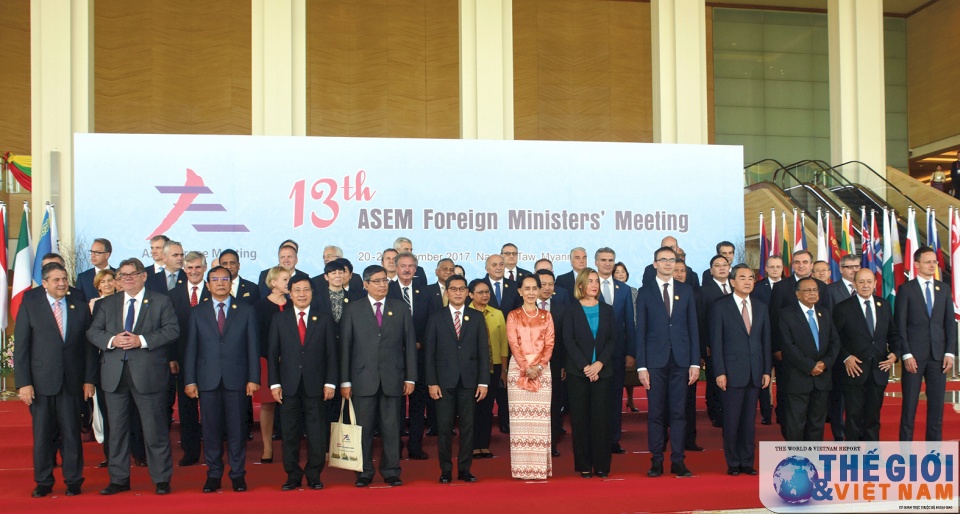 |
| Deputy Prime Minister, Foreign Minister Pham Binh Minh attended the 13th Foreign Ministers’ Meeting of the Asia-Europe Meeting (ASEM). |
In his speech, DPM Pham Binh Minh emphasized: “Over the past year, since the Ulaanbaatar Summit, we have experienced challenging times in our two regions, and around the world. The regional and global landscape is undergoing rapid and complex developments, even shifts, with intertwined opportunities and challenges. Entering its third decade, ASEM is at a critical juncture that calls for further transformation and reassertion of its relevance in the evolving global architecture. This is the time to build a vision for a responsible and responsive ASEM as a champion of multilateral cooperation.”
On this basis, DPM Minh urged Europe and Asia to continue taking the lead in maintaining world peace and stability, promoting dialogue, confidence-building, and upholding international law. The two continents should also be on the front line to champion the 2030 Sustainable Development Goals, delivering concrete action on sustainable and inclusive growth. Moreover, it is crucial to promote poverty eradication, comprehensive connectivity, and high-quality education and human resources development in the digital age. Lastly, climate change, disaster risk reduction, sustainable management of natural resources, as well as food – water – energy security should be high on the list of priorities.
ASEM needs to sustain its unwavering support to uphold just and equitable global economic governance and an open, transparent, rules-based and inclusive multilateral trading system; discussion on issues of next-generation trade and investment; development of global value chains and supply chains, and increasing innovation among MSMEs.
| Within the framework of the Meeting in Nay Pyi Taw, Myanmar, Deputy Prime Minister, Foreign Minister Pham Binh Minh held bilateral meetings with his counterparts from France, Luxembourg, Hungary, Finland, Romania, Germany, and Norway, as well as with the Minister of State at the Department of Foreign Affairs and Trade of Ireland. At the meetings, the leaders highlighted Vietnam’s achievements in social-economic development and integration; congratulated Vietnam on successfully hosted the APEC Economic Leaders’ Week 2017; and expressed the urge to promote cooperation relations in a range areas with Vietnam. |
On the occasion, DPM Minh recalled the commitments made by APEC economic leaders at their meeting in Da Nang on open trade and investment. He underlined their continued support for the multilateral trading system, fostering inclusive economic, financial and social development and building the APEC Post-2020 vision. Adding to that, he also emphasized the prospects of finalizing the Regional Comprehensive Economic Partnership (RCEP) and the new Comprehensive and Progressive Trans-Pacific Partnership (CPTPP). He reaffirmed that peace, stability, economic integration and sustainable development are still significant trends in the Asia-Pacific region, which act as a driver in strengthening relations between Asia and Europe.
The Deputy Prime Minister noted that Vietnam and ASEAN members will continue working closely with the international community, including ASEM, to maintain and promote peace, stability, safety, security and freedom of navigation and overflight as well as unimpeded commerce in the region, especially in the East Sea. As an active member, Vietnam will continue to cooperate with ASEM in sustaining peace, security, and stability of the Asia-Pacific region and the world.
Promoting multilateralism and order of fairness
ASEM plays an essential role as a mechanism in promoting dialogue and cooperation, as well as providing a vivid framework representing the members’ shared commitment to strengthening the partnership between Asia and Europe. This message was highlighted by Myanmar’s State Counsellor, Minister of Foreign Affairs Aung San Suu Kyi.
Under the theme of “Strengthening Partnership for Peace and Sustainable Development,” the meeting set out orientations and visions for ASEM cooperation in its third decade of development, with specific measures to boost collaboration across three pillars: political dialogue, economic cooperation, and cooperation in other fields.
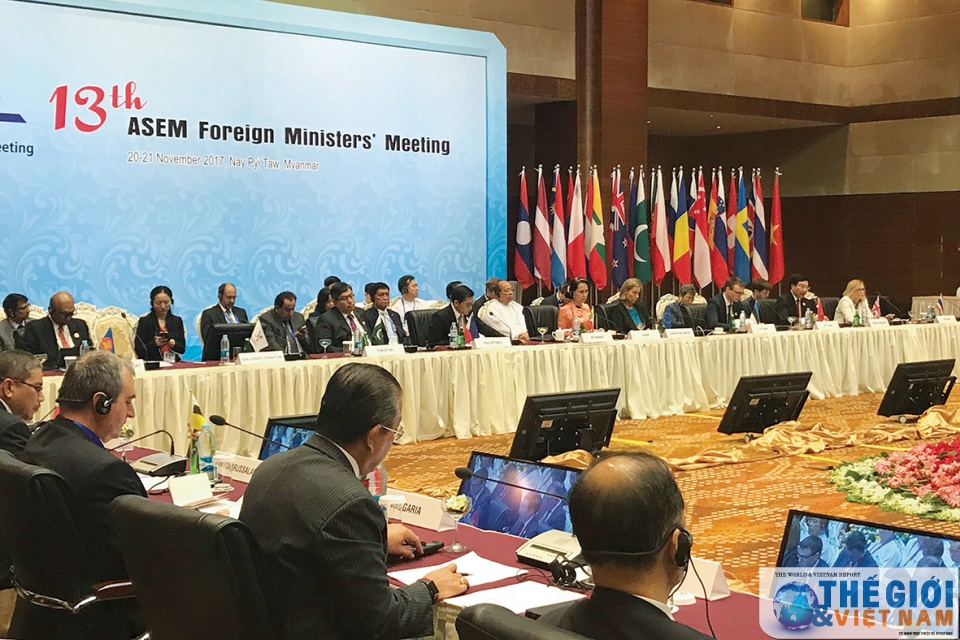 |
At the first plenary session themed “Synergizing Peace and Sustainable Development”, attendees agreed to increase dialogue and cooperation in maintaining peace and stability in the two regions and the world; fostering multilateralism and an order of fairness and democracy on the basis of the United Nations Charter’s principles and international law; and strengthening cooperation in addressing traditional and non-traditional security challenges. Ministers concurred on the need for the continuation of policy coordination, trade, and investment promotion, support for a rule-based multilateral trading system and the central role of the WTO; assistance for MSMEs; as well as sustainable, inclusive and balanced growth.
Collaborate to cope with global challenges
At the meeting, the Ministers also pledged to accelerate the implementation of the 2030 Agenda for Sustainable Development and the Paris Agreement on Climate Change; emphasised the need for financial support, poverty reduction, natural disasters and climate change adaptation; promoting the Mekong-Danube cooperation on water resources management, technology transfer and capacity building for developing countries; and enhancing the contributions of young people, women and businesses.
| After 20 years of establishment (since 1996), the Asia-Europe Meeting (ASEM) has become an important dialogue mechanism between the two continents, bringing together 53 members, including four permanent members of the UN Security Council and 12 members of the group of the world’s 20 largest developing and emerging markets (G20). ASEM makes up 68 percent of the global population, contributes approximately 55 percent of GDP and almost 60 percent of global trade. |
During the second plenary session on “Promoting a more dynamic and cohesive ASEM in the third decade of cooperation,” the meeting affirmed the need for a stronger and more dynamic partnership between Asia and Europe while upholding the core values and principles of ASEM. There were intense exchanges on connectivity, with attendees agreeing that connectivity is a fundamental part of ASEM cooperation, contributing to the advancement of the Asia-Europe partnership in efforts to cope with global challenges and sustainable development.
Ministers agreed to strengthen cooperation on connectivity in three aspects: infrastructure, institutions and people, especially trade, investment, transport, digital connections, education and human resources development, and tourism. The meeting applauded the proposal by the ASEM Working Group on interconnection, which identified the priorities and itinerary for the 12th ASEM Summit to be held next year in Belgium.
The Ministers also discussed international and regional issues such as peace, security, terrorism, disarmament, and maritime security. The member countries shared their evaluations of complex situations in the Middle East-North Africa and Ukraine, as well as the migrant crisis and impact of Brexit. Many members expressed their concern about developments affecting security in Asia, including tensions on the Korean Peninsula, in the East Sea, and the East China Sea.
The meeting acknowledged the urgent need to strengthen cooperation to maintain peace, security, and stability; affirming their commitment to working together to keep peace, stability and prosperity, security, safety and freedom of navigation and aviation, as well as free trade; boosting confidence-building measures, refraining from the threat or use of force, resolving disputes by peaceful settlement on the basis of international law, including the UN Charter and the UN Convention on the Law of the Sea 1982 (UNCLOS 1982).
The 13th ASEM Foreign Ministers’ Meeting ended on a high note. The meeting adopted the Chairman’s Statement along with a number of important decisions. The Ministers also passed 15 new initiatives, including Vietnam’s “ASEM Summit on Climate Change Resilience to Achieve Sustainable Goals" which was highly praised by many members.
| Within the ASEM framework, Vietnam has proposed 22 initiatives and coordinated with other members to raise 26 initiatives, all of which have materialised. Such initiatives mainly focus on culture, health care, transport, food and energy security, climate change, science-technology, tourism, economy, green growth and social welfare. In 2017, Vietnam successfully hosted the “ASEM Conference on Creative Education and Human Resource Development for Sustainable Development,” which is one the initiatives proposed by Vietnam. Vietnam is one of the members raising and participating in five out of 16 cooperation groups on water resource management, climate change response and vocational training, as well as education and human resource development and technological connectivity. |
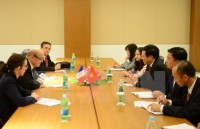 | ASEM FMs’ Meeting: Deputy PM meets foreign ministers Deputy Prime Minister and Foreign Minister Pham Binh Minh had separate meetings with Foreign Ministers of France, Luxembourg, Hungary, Finland, Romania and Germany within the ... |
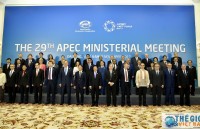 | 29th AMM reaffirms its role as driver for regional growth and economic integration On November 9, in Da Nang, the 29th Asia-Pacific Economic Cooperation (APEC) Ministerial Meeting, under the chairmanship of the Vietnamese Deputy Prime Minister and Minister ... |
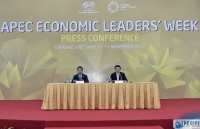 | The 29th APEC Ministerial Meeting has successfully concluded The 29th APEC Ministerial Meeting (AMM) has extended its session until the morning of November 9, instead of ending on November 8 as planned. |

















